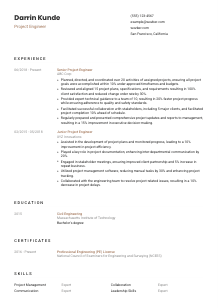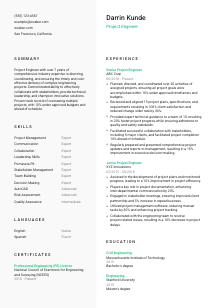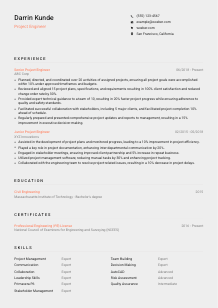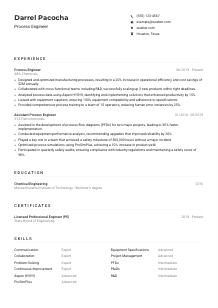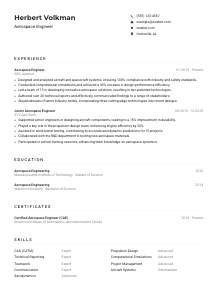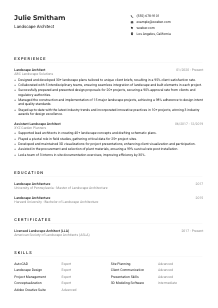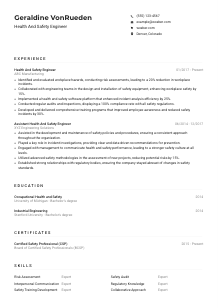Project Engineer Resume Example
Mastering blueprints, but your resume's design looks fuzzy? Delve into this Project Engineer resume example, crafted with Wozber free resume builder. Discover how to align your structural expertise with job specifics, constructing a career trajectory that's as solid as your foundations!
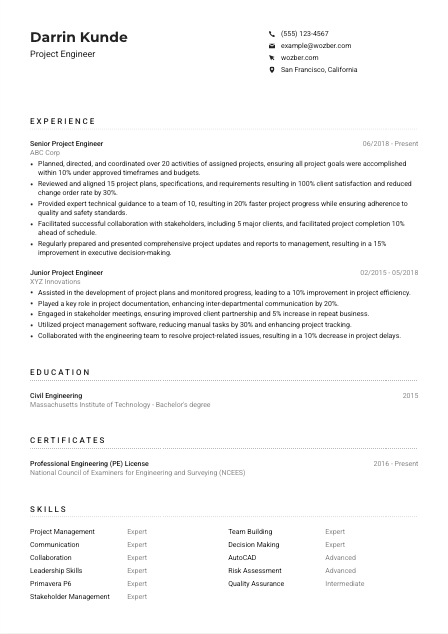
How to write a Project Engineer Resume?
Hello, future Project Engineer champion! Navigating the competitive world of engineering and project management requires more than just expertise; it also demands a resume that shines brighter than a freshly polished blueprint. With the aid of the Wozber free resume builder, this guide aims to empower you to craft a resume that's not only a testament to your achievements but also perfectly tailored to the job you're eyeing.
Ready to create a resume that bridges your talent to your dream job? Let's embark on this adventure together, leveraging the finest practices, an ATS-friendly resume format, and ATS optimization tools that Wozber proudly offers.
Personal Details
Crafting the Personal Details section is like laying the foundation for your resume. This is where you make your first impression, so let's ensure we're off to a flying start, especially tailored for the Project Engineer position. This guide will navigate you through crafting a section that's more than just accurate; it's strategically aligned with the Project Engineer role expectations.
1. Brand Yourself Boldly
Your name is not just an identifier; think of it as your personal brand emblem at the top of your resume. Make it stand out with a clear, readable font that sets the stage for the professional narrative you're about to unfold. This is particularly crucial for a Project Engineer, where precision and clarity are key.
2. Tag Yourself with Proficiency
Below your name, mirror the job title from the description to strike immediate relevance. For a Project Engineer position, this alignment subtly reinforces your suitability and focus, priming the hiring manager's perception right from the start.
3. Chart Your Contact Coordinates
Include essential contact details like a phone number and a professional email format (firstname.lastname@email.com). It's crucial to ensure these are correct – a small typo could mean a missed connection. Plus, if you're based in or around San Francisco, as our example mentions, highlight this to meet geographical preferences.
4. Map Your Online Territory
If you have a LinkedIn profile or a personal website that showcases your projects or portfolio, include it. For a Project Engineer, this could be a valuable asset, offering a deeper dive into your capabilities and achievements. Ensure it's up-to-date and reflects your resume.
5. Keep It Professionally Personal
Avoid diluting this professional snapshot with personal stats like age or marital status. Your aim here is to build a bridge to potential employers, not give away your life story. Remember, every piece of information should purposefully pivot you closer to your role as a Project Engineer.
Takeaway
Think of the Personal Details section as your resume's handshake: it needs to be strong, confident, and professional. By ensuring this initial connection is polished and aligned with the Project Engineer role, you set a promising stage for the narrative that follows. Ready to make a standout first impression? Let's build on this solid groundwork.





Experience
The Experience section is where your resume really starts to construct its argument for your candidacy. For a Project Engineer role, showcasing your professional journey with precision and relevance is crucial. Let's delve into transforming your experience into a compelling showcase of your engineering and project management prowess.
- Planned, directed, and coordinated over 20 activities of assigned projects, ensuring all project goals were accomplished within 10% under approved timeframes and budgets.
- Reviewed and aligned 15 project plans, specifications, and requirements resulting in 100% client satisfaction and reduced change order rate by 30%.
- Provided expert technical guidance to a team of 10, resulting in 20% faster project progress while ensuring adherence to quality and safety standards.
- Facilitated successful collaboration with stakeholders, including 5 major clients, and facilitated project completion 10% ahead of schedule.
- Regularly prepared and presented comprehensive project updates and reports to management, resulting in a 15% improvement in executive decision‑making.
- Assisted in the development of project plans and monitored progress, leading to a 10% improvement in project efficiency.
- Played a key role in project documentation, enhancing inter‑departmental communication by 20%.
- Engaged in stakeholder meetings, ensuring improved client partnership and 5% increase in repeat business.
- Utilized project management software, reducing manual tasks by 30% and enhancing project tracking.
- Collaborated with the engineering team to resolve project‑related issues, resulting in a 10% decrease in project delays.
1. Dissect the Project's Blueprints
Kick off by dissecting the job description, identifying keywords and phrases that resonate with the role's demands. For a Project Engineer, focus on experiences that highlight project coordination, stakeholder collaboration, and technical guidance – these are your resume's load-bearing walls.
2. Construct Your Career Lineage
Structure your experience in reverse-chronological order, spotlighting your roles, companies, and employment periods. Each entry should narrate your part in the project's success story, underscoring your contributions to meeting goals, driving efficiency, and navigating technical challenges.
3. Engineer Your Achievements
For each role, craft accomplishment statements that mirror job specifics. Quantify these achievements wherever possible – numbers bring your impact into sharp relief, a technique that's particularly persuasive in the project engineering realm. Show projects completed under budget, timelines accelerated, and quality benchmarks hit.
4. Prioritize Relevance Over Volume
It's tempting to list every project you've touched, but relevance is key. For the Project Engineer position, fine-tune your focus to experiences that resonate loudly with the job description. This strategic selectivity transforms your resume into a laser-focused argument for your candidacy.
5. Highlight Software Proficiency
Given the role's requirement for proficiency in project management and scheduling software, don't forget to showcase your experiences with relevant tools like Primavera P6 or MS Project. This demonstrates not just your technical acumen but also your readiness to hit the ground running.
Takeaway
Your Experience section should read like a well-organized project plan, demonstrating clear outcomes and your role in achieving them. By crafting this section with precision, relevance, and a focus on quantifiable achievements, you're constructing a strong case for why you're the ideal Project Engineer for the job. Now, let's cement your qualifications with a robust Education section.
Education
The Education section of your resume may seem like a straightforward recount of your academic credentials, but in the realm of project engineering, it's a critical component of your professional profile. Let's ensure your education resonates with the foundational requirements of the Project Engineer role and propels you toward success.
1. Lay the Foundation
Identify the education level the job explicitly requires. For Project Engineers, a Bachelor's degree in Engineering or a related field is fundamental. Aligning your degree with these core requirements establishes your academic credibility, anchoring your qualifications within the role's expectations.
2. Frame Your Academic Journey
Simplify and streamline your educational history. List your field of study, degree, institution's name, and graduation year. For an aspiring Project Engineer, highlighting additional degrees like a Master's that enhance your expertise could make your resume stand out.
3. Engineer a Connection
If your degrees align directly with the job's demands, spotlight them. For instance, a Bachelor's and Master's in Civil Engineering vividly illustrate your deep dive into the principles and practices that underpin the Project Engineer role. This kind of alignment speaks volumes.
4. Blueprint Additional Academic Achievements
Should you possess other academic highlights such as honors, relevant coursework, or membership in engineering societies, consider including these. This adds depth to your profile, showcasing a commitment to your field that goes beyond the minimum.
5. Adjust the Lens for Seniority
If you're vying for a more seasoned Project Engineer position, weigh the relevance of each educational detail. Senior roles may place more emphasis on professional experience and achievements, so tailor this section to reflect what's most likely to resonate with your potential employer.
Takeaway
The Education section is more than a list of institutions and degrees; it's a testament to your preparedness for the Project Engineer role. By carefully selecting and presenting your academic credentials, you lay a solid foundation that supports your professional experiences and underscores your suitability for the position. Let's continue to build your resume by honing in on certifications that elevate your standing.
Certificates
In the ever-evolving field of engineering, certificates act as badges of continuous learning and specialization. Specifying certifications that align with the Project Engineer role not only reflects your commitment to the field but also provides a competitive edge. Let's navigate the optimal way to showcase these achievements on your resume.
1. Survey the Blueprint
Begin by revisiting the job description to identify any preferred or required certifications. The preference for a Professional Engineering (PE) license is a beacon guiding you to highlight this accolade prominently if you have it. This matches the employer's expectations with your qualifications.
2. Select and Showcase
Quality over quantity is paramount when listing certifications. Opt for those with direct relevance to the Project Engineer role, ensuring these highlights don't get lost in a sea of less pertinent credentials. This focused approach guides the hiring manager's attention to your most marketable qualifications.
3. Timelines Tell a Tale
Including the acquisition or validity dates of your certifications can be particularly enlightening. This context shows your currency in the field and dedication to ongoing professional development, two traits highly valued for a Project Engineer.
4. Keep Your Toolkit Updated
As project engineering technologies and methodologies evolve, so should your certifications. Regularly seeking new learning opportunities and renewing existing certifications underline your commitment to staying at the forefront of your profession.
Takeaway
Effectively selected and showcased certifications can significantly elevate your Project Engineer resume, highlighting your specialized knowledge and ongoing commitment to professional growth. Like the best-laid plans, this section requires precision and foresight, ensuring each certification you list directly contributes to your narrative as an exceptional candidate.
Skills
The Skills section is your chance to showcase the professional toolkit you bring to the Project Engineer role. In a field where both technical prowess and soft skills are paramount, carefully selecting and presenting your competencies can make your resume stand out. Follow these steps to effectively highlight skills that resonate with hiring managers.
1. Break Down the Job Blueprint
Initiate this section by parsing the job description for explicit and implicit skill requirements. For a Project Engineer, this involves identifying both technical skills like "Proficiency in project management software" and soft skills like "Strong communication and leadership." This dual focus is integral to your success in the role.
2. Inventory Your Skill Set
Match your own skills against those identified from the job description. This inventory should not be exhaustive but prioritized to spotlight skills that underscore your fit for the Project Engineer role. Integrate both hard skills and soft skills to provide a holistic view of your capabilities.
3. Curate and Classify
Resist the temptation to list every skill you possess. Instead, present a curated selection that speaks directly to the Project Engineer position, organized for easy scanning. This targeted approach conveys your qualification succinctly, making a strong impression.
Takeaway
The Skills section offers a snapshot of your professional capabilities tailored to the Project Engineer role. By accurately deciphering and responding to the job description, you position yourself as not just a competent candidate but a standout one. Your skills articulate the promise of the value you'll bring to the role; wear them proudly and continue to sharpen them.
Languages
In today's global engineering projects, the ability to communicate effectively across language barriers can be a game-changer. While English may be essential, additional languages can differentiate you as a candidate for the Project Engineer role. Here's how to strategically highlight your linguistic talents.
1. Interpret the Job Script
Assess the language requirements or preferences specified in the job posting. For our Project Engineer position, English proficiency is a must. Prioritizing this in your languages section reinforces your eligibility for the role.
2. Rank Your Language Mastery
Prioritize languages on your resume based on the job requirements, ensuring your proficiency level is clear. Whether it's native, fluent, intermediate, or basic, this hierarchy and transparency provide insight into your communication capabilities.
3. Add Global Dialects
Even if not directly mentioned in the job description, additional languages you speak could be a valuable asset, especially in roles requiring cross-cultural collaboration. Listing these showcases your versatility and global perspective, a notable advantage for a Project Engineer.
4. Articulate Your Fluency
Articulate your language proficiencies honestly, considering the role's communication demands. Accurate portrayal prevents potential misunderstandings and showcases your integrity, aligning your linguistic skills with the Project Engineer's requirements.
5. Assess the Role's Global Scope
For Project Engineer positions with a broader geographical scope or international stakeholders, proficiency in multiple languages can dramatically boost your candidacy, offering a tangible edge in a competitive job market.
Takeaway
Your language skills do more than just tick a box; they open doors to international projects and collaborations, enriching your professional journey. Even basic proficiency marks a step towards greater understanding and effectiveness in diverse teams. Let your resume reflect your linguistic versatility, a valuable trait for any Project Engineer working in today's interconnected world.
Summary
The Summary is your elevator pitch, distilling your qualifications into a concise narrative that captivates and convinces. For a Project Engineer aiming to make an immediate impact, this section is your chance to frame your experience and aspirations in the context of the role. Let's craft a summary that breaks new ground.
1. Decode the Job's Core
Kick off your summary by internalizing the essence of the Project Engineer role. What are the key responsibilities and skills highlighted? Understanding this sets the stage for a summary that not only mirrors the job description but also emphasizes your alignment with the role.
2. Launch with Your Identity
Begin with a strong opening sentence that introduces you as a professional. For example, "Project Engineer with over 7 years of industry expertise" sets a tone of experience and specialization, instantly connecting with the role you're targeting.
3. Bridge to Key Qualifications
Segue into a brief showcase of critical skills and notable achievements that respond directly to the job description. This tailoring demonstrates your specific readiness for the Project Engineer role, highlighting experiences that parallel the employer's needs.
4. Keep It Snappy
Remember, the summary is your highlight reel, not the complete game tape. Aim for brevity while packing a punch, encapsulating your professional essence in a few compelling lines. This precision ensures your resume opens with energy and relevance.
Takeaway
Your Summary isn't just an introduction; it's a strategic lever that shifts the hiring manager's attention in your favor. Tailoring this section to the Project Engineer role, you prime the reader for the detailed narrative that follows, positioning yourself as the blueprint of an ideal candidate. With your resume's foundation set and your project plan in place, you're ready to engineer your path to success.
Launching Your Project Engineer Journey
Congratulations on crafting a resume that stands as a testament to your Project Engineer expertise and ambition. By following these steps, you've built a resume that's not just ATS-compliant but one that resonates with the essence of the role you're aspiring to. Remember, your resume is a dynamic document that should evolve alongside your career. Use Wozber's free resume builder, including its ATS-friendly resume templates and ATS resume scanner, to keep your resume in peak condition.
The world of engineering awaits your talent and drive. Here's to constructing your future, one project at a time!

- Bachelor's degree in Engineering or a related field.
- Minimum of 4 years of project management or engineering experience.
- Proficiency in project management and scheduling software.
- Strong communication, collaboration, and leadership skills.
- Professional Engineering (PE) license is preferred.
- Ability to speak and write in English essential.
- Must be located in or willing to relocate to San Francisco, CA.
- Plan, direct, and coordinate activities of assigned projects to ensure project goals and objectives are accomplished within approved timeframes and budgets.
- Review project plans, specifications, and requirements to ensure alignment with company standards and client expectations.
- Provide technical support and guidance to project teams, monitoring progress and ensuring quality and safety standards are met.
- Collaborate with various stakeholders, including clients, contractors, and regulatory agencies, to facilitate project success.
- Prepare and present project updates, reports, and documentation to management and clients as required.





